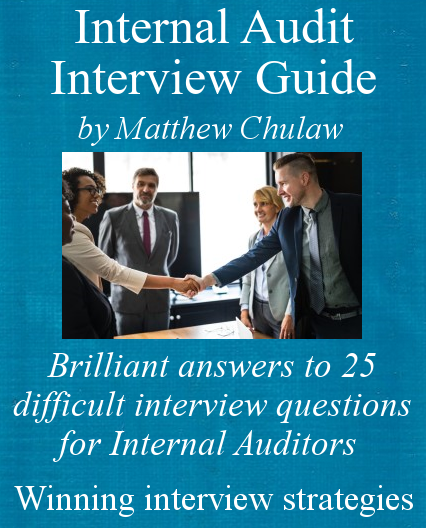Dear job seeker,
I will keep this page short and to the point. Here’s what I have for you today:
* Latest update of the eBook: December 2023.
In the eBook, you will find multiple great answers to each of the following questions:
- Why do you want to work as an internal auditor?
- How do you imagine a typical day in this job?
- What do you consider the main auditing risks in the company of this type?
- What is your opinion on cooperating with external auditors?
- Explain the basis steps in conducting internal audit.
- Why did you leave your last job (why do you plan to leave your present job)?
- How do you ensure to keep your knowledge of laws and regulations up to date?
- What is the first thing you would do after starting in this job?
- What do you consider your biggest weakness as an auditor?
- Have you ever detected a case of fraud? What process did you follow?
- Imagine a situation where you have to deal with uncooperative colleagues. What will you do?
- Describe the biggest failure of your professional career.
- … and thirteen other tough questions you will often face in your internal audit interview.
Check the sample to see how this eBook can help you:
Sample from the eBook
Q: Have you ever detected a case of fraud? What process did you follow?
Hint: This is a tricky question and you should not make the same mistake many do—claiming that fraud detection is not a duty of an internal auditor.
Following the guidance of auditing standards, your responsibility is to plan and perform an audit to obtain reasonable assurance about whether the financial statements are free of material misstatement, whether caused by error or fraud.
And that’s exactly the question of attitude. Surely, you can’t detect all frauds from the position of an auditor, and you do not study (and verify) the financial statements with a primary goal to detect fraud.
But as long as you find material misstatement and believe it didn’t result from a mistake—but from a conscious action of an employee, you should report it.
More likely than not you have never experienced this situation before. Say what you would do—show the right attitude.
Sample answers
– Since this is my first job application, I have never detected a case of fraud in work. But I strongly believe that we auditors should report any material misstatement in financial statement, and if we have some indication that an accountant, manager, or anyone else did it on purpose—falsifying numbers or even documents, we have to report our suspicion to compliance officer. Then it is their job to investigate the case and address it.
– Once I discovered that an employee used a company expense account for personal expenses and submitted them as business-related. The sum of money was quite substantial, and I decided to report this immediately to the compliance officer. I believe that our primary role is to audit the business process, but we shouldn’t be blind to bad things happening in the company. Anytime we discover anything suspicious while doing our job, we should report it.
Q: What is the first thing you would do after starting in this job?
Hint: Changing your LinkedIn profile, smoking a good cigar in your comfy office, and buying a new car. Or at least calling your friends and sharing the good news, throwing in a big party.
Perhaps you’d do that, but they want to hear something else in a job interview.
I suggest you to say that you would eagerly anticipate the orientation, and talks with senior auditors, trying to understand your role in the auditing/accounting department, and what you’ll be responsible for.
This is a good answer especially when you apply for an entry level role, or for an auditing job in a company that employs several auditors.
If you apply in a smaller organization, however (and it doesn’t matter whether for-profit or non-profit, private or public), and will be the only auditor in the organization, say that the first thing you’ll do will be reviewing the results of the last audit—if they made any.
If they didn’t (can be the case in new and growing companies), say that the first thing will be understanding the business process in detail (talking to leaders of the company and common employees), and planning the audit schedule accordingly.
Sample answers
– If I understand it correctly, you run an entire auditing department in your company. Likely the first thing I would do is talking to the leaders of the department, trying to understand my role and responsibilities, and how I can bring value to your existing team of auditors.
– This depends on whether you have ever audited the business process in your company. If you have, I’d review the latest audit, the results and suggested improvements. This should help me understand where we stand right now, and how to plan and conduct the ensuing audits. If you haven’t audited the business process yet, I’d start with analyzing the business process, talking to heads of departments and also common employees, and plan the audit schedule accordingly. That’s likely the first thing I’d do after starting in this job.
End of the sample
These are just two questions. You will find 25 in the eBook, including personal, behavioral, and technical questions. But that’s not all.
To ensure you will get the job, I included in the book six principles you need to understand before you can ace this interview.
Without talking too much about them, let me show you another sample from the book:
Sample no. 2
Principle no. 1: Focus on attitudes
Whether you answer a simple question, or a seemingly difficult one, whether you shake hands with your interviewers or choose a chair to sit on in an office, whether you write your answers online, or sweat answering questions face to face, people who consider hiring you (and want to do so at the end, because they need new internal auditor) observe only two things: your attitudes, and opinions.
They look mostly for the following in a good job candidate:
Responsibility.
It’s no fun when company loses money, or doesn’t use the opportunities to improve the business process. When a company fails to manage the risks, it can easily slip to red numbers. Razor-thin profit margins that most companies operate with nowadays make your role even more crucial.
There is a lot of responsibility involved, in everything you’ll do on a daily basis.
You should demonstrate a mature sense for responsibility in your answers. Do not take things lightly. There’s no place for jokes in this interview. Show them that you mean business and will approach each day in work being aware of the responsibility you carry on your shoulders.
Answer each question to the point, bring everything to the interview with you (resume, cover letter, references, certification—if you have them, of course), show up on time. Demonstrate your sense for responsibility with everything you say and do in an interview—even things you say about your past jobs.
Integrity.
You should live and breath for the company—at least during your working hours. You should not leak any information to the competition, and you should not seek personal benefits, taking advantage of your insider knowledge. And you should take things seriously.
Having strong moral principles and believing in your role in the company is absolutely crucial for this job.
Anytime they ask you about a situation from the past (how you acted, what you did, what you considered doing), or about a fictive situation (what you would do if this or that happened while auditing), cling to your moral principles, and your role in the company.
You know the rules and laws, and you acted to promote the culture of compliance and ethics throughout the entire organization. You worked for the sake of a company—and not this or that manager. You didn’t mind reporting fraud, you didn’t hold sites with anyone—and you plan to continue working in the same manner.
Attention to detail.
Percentages and tenths make a difference. A single wrong number (misinterpreted by you, or purposely misinterpreted by someone from the company) can change the result of the entire financial analysis. From red numbers to green numbers, from fraud to creative accounting…
This should not happen to a good accountant, auditor, or analyst. Ensure the interviewers that you care about details.
Use numbers anytime possible in your interview answers. Talk in details about your past jobs, or about anything else—when there’s an opportunity. They should feel that you care for details and won’t neglect them as an auditor.
Independence.
Though you will likely report to CEO or to the board, or to the chief of an auditing committee (when we speak about bigger organizations), and will get some training and instructions in the job, you shouldn’t be influenced by anyone in the company. A strong degree of independence is expected from you, and……………..
End of the sample

So that’s it. I do not want to waste your time with lengthy sales pages, and imaginary discounts or fake reviews, like other people do on their websites while trying to sell you something.
You have read the samples, you know what the eBook is about, and surely you can tell whether it will help you.
I sincerely believe it will. And you can read it easily in two or three hours, it’s 13,000 words. Only things that truly matter, no secondary content.
Plus, of course, like with everything else we sell here on InterviewPenguin.com, you have a risk free sixty days money back guarantee. If you don’t like this eBook for any reason, or no reason at all, just let me know (email me at matthew[at]interviewpenguin[dot]com) within 60 days and we will give you a full refund.
Quick Summary
- Brilliant answers to twenty-five difficult questions you may get in your interview for a job of an Internal Auditor.
- Published in 2020, updated in 2024.
- Several sample answers to each question, so you can choose one that reflects your values and experience.
- Six principles of acing the interview, things you simply need to know in order to make the right impression on the hiring managers.
- Instant download, .PDF format (you can read it on any device (mobile, kindle, PC), and you can easily print it).
- Secure and simple checkout with PayPal, you can pay with your credit/debit card, or with your PayPal account.
- Price: $7.77, one time payment, no hidden fees or upsell. 60 days risk free money back guarantee . Sold exclusively on InterviewPenguin.com.
- Click the checkout button below to proceed to the payment.
(After the payment you will be directed back to our website, to a protected page, to download your eBook. You will also receive a download link and instructions to your email, just to ensure that you will get the book without waiting, even if the redirect fails.)
That’s it. Your interview does not have to be stressful, or difficult. You can interview with confidence, and give brilliant answers to all tough questions. Download the guide today, and succeed in your interview.
Sincerely,
Matthew Chulaw,
Your personal job interview coach
P.S. Do not hesitate to send me a message if you have any questions about the guide. I try my best to answer all messages within twelve hours (matthew[at]interviewpenguin[dot]com). Thank you!

